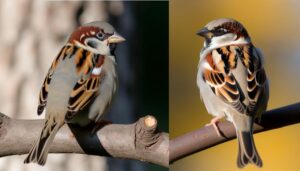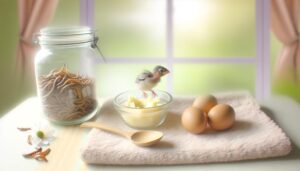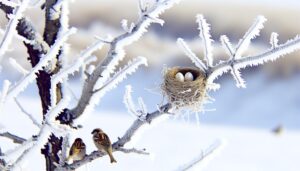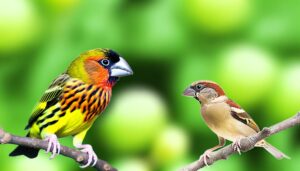Can Newborn Sparrows Be Fed Jarred Baby Food?
Feeding a newborn sparrow jarred baby food isn't advisable. Newborn sparrows need a balanced diet rich in proteins, fats, vitamins, and minerals, essential for their growth.
Jarred baby food lacks the high protein and fat content necessary for sparrows and often contains harmful preservatives and sugars. Additionally, the texture can lead to digestive issues like diarrhea or constipation.
Instead, use a specialized hand-rearing formula designed for birds, ensuring proper nutrition and development. Proper diet and care are crucial for their health and survival.
Explore further to understand the best practices for feeding and nurturing a newborn sparrow.
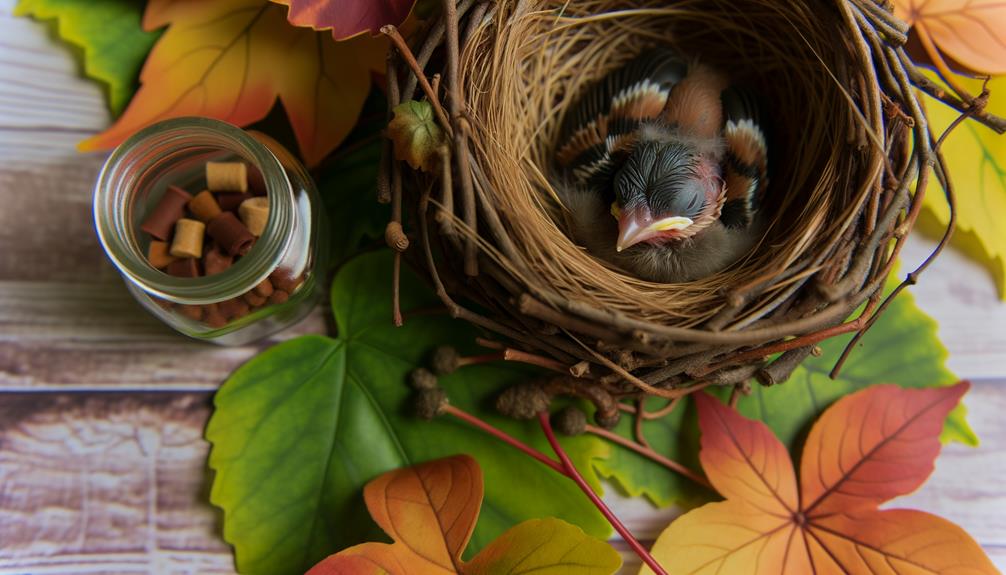
Key Takeaways
- Newborn sparrows need a high-protein diet, which jarred baby food lacks.
- Jarred baby food can contain harmful preservatives and sugars for sparrows.
- Feeding sparrows jarred baby food can cause nutritional deficiencies and digestive issues.
- Specialized hand-rearing formulas are better suited for sparrows' dietary needs.
- Proper tools and sterilization are crucial for feeding newborn sparrows safely.
Nutritional Needs of Newborn Sparrows
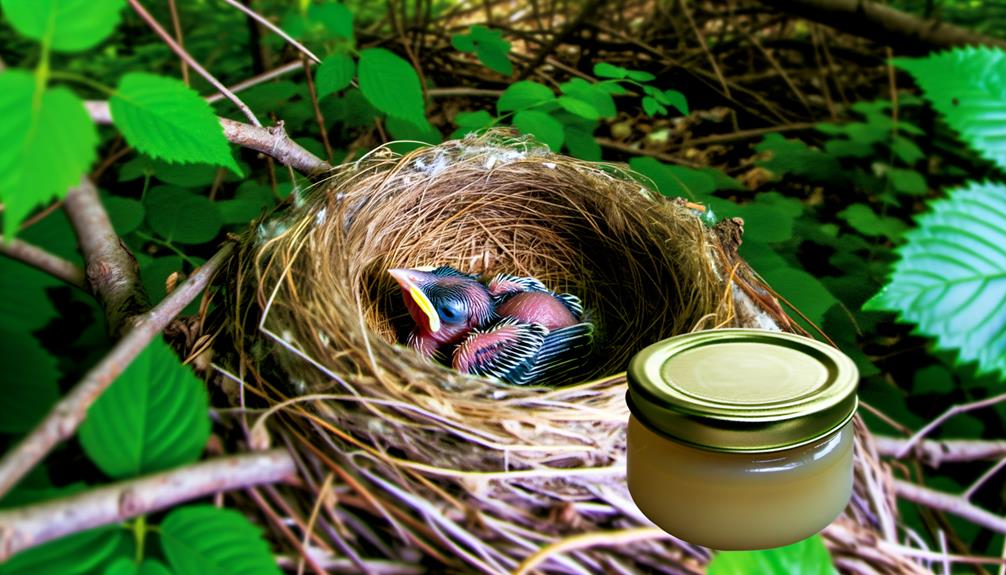
Understanding the nutritional needs of newborn sparrows is pivotal for their survival and development. You must guarantee they receive a balanced diet rich in proteins, fats, vitamins, and minerals.
Newborn sparrows primarily require a high-protein intake, as proteins are essential for their rapid growth and feather development. Insects and small invertebrates are their natural protein sources.
Additionally, fats provide the necessary energy for their metabolic processes. Calcium and phosphorus are crucial for bone growth, while vitamins A, D, and E support overall health and immune function.
Hydration is equally significant; guarantee they've access to clean water. By meeting these dietary requirements, you'll greatly enhance their chances of thriving and eventually adapting to their natural environment.
Ingredients in Jarred Baby Food
Jarred baby food often contains ingredients that are specifically formulated to meet the nutritional needs of human infants, but not all of these components are suitable for newborn sparrows.
These foods typically include pureed fruits, vegetables, and grains, fortified with iron and essential vitamins. However, newborn sparrows require a diet high in protein and fat, elements that are generally lacking in jarred baby foods.
Additionally, the preservatives and added sugars found in some baby foods can be detrimental to a sparrow's health. You should also consider the texture; baby food purées are often too smooth for a sparrow's developing digestive system, which is adapted to handle regurgitated food from parent birds.
It's essential to evaluate each ingredient meticulously.
Potential Risks and Concerns
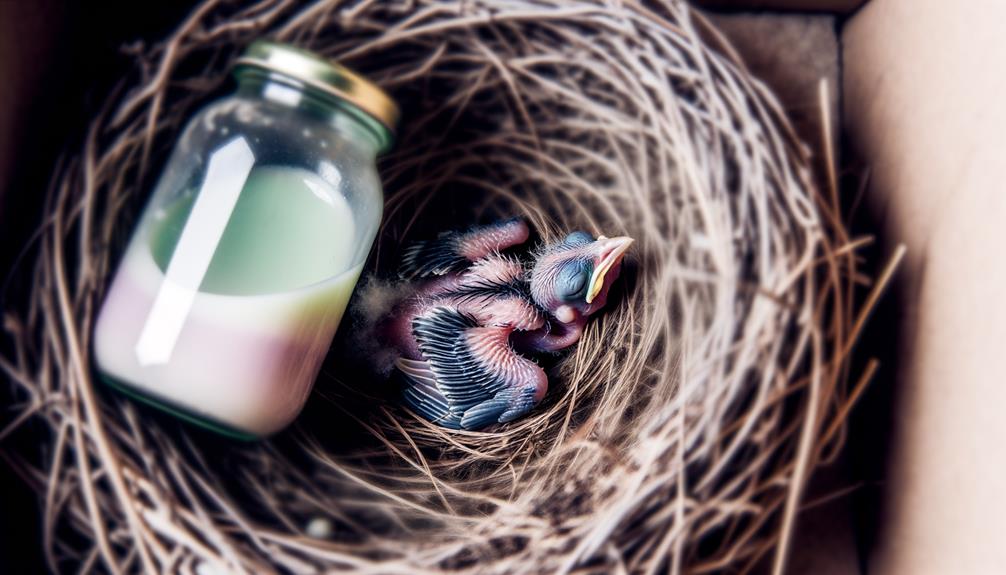
Feeding newborn sparrows jarred baby food presents several significant risks. These include nutritional deficiencies, digestive complications, and potential toxicities due to inappropriate ingredients.
Sparrow chicks require a diet rich in specific proteins, vitamins, and minerals that jarred baby food often lacks. Nutritional deficiencies can lead to stunted growth and developmental anomalies.
The digestive systems of sparrows are adapted for a natural diet. Introducing jarred food may cause gastrointestinal distress, such as diarrhea or constipation.
Ingredients like onions, garlic, or preservatives frequently found in baby food can be toxic to birds. It's vital to recognize the unique dietary needs of these avian neonates and avoid feeding them foods not specifically formulated for their species.
Alternative Feeding Solutions
Given the significant risks associated with feeding newborn sparrows jarred baby food, exploring appropriate alternative feeding solutions becomes essential for their health and development.
You should consider using a specialized hand-rearing formula designed for passerines, which provides essential nutrients and mimics their natural diet. Mixing the formula to the right consistency guarantees optimal digestion and growth.
Additionally, using a syringe or pipette for feeding can help control portion sizes and reduce the risk of aspiration. Sterilize feeding tools to prevent bacterial infections.
Evidence shows that providing a balanced diet with adequate proteins, fats, and vitamins supports robust immune functions and proper feathering, essential for fledgling survival.
Prioritize evidence-based approaches to achieve the best outcomes for these vulnerable birds.
Best Practices for Sparrow Care
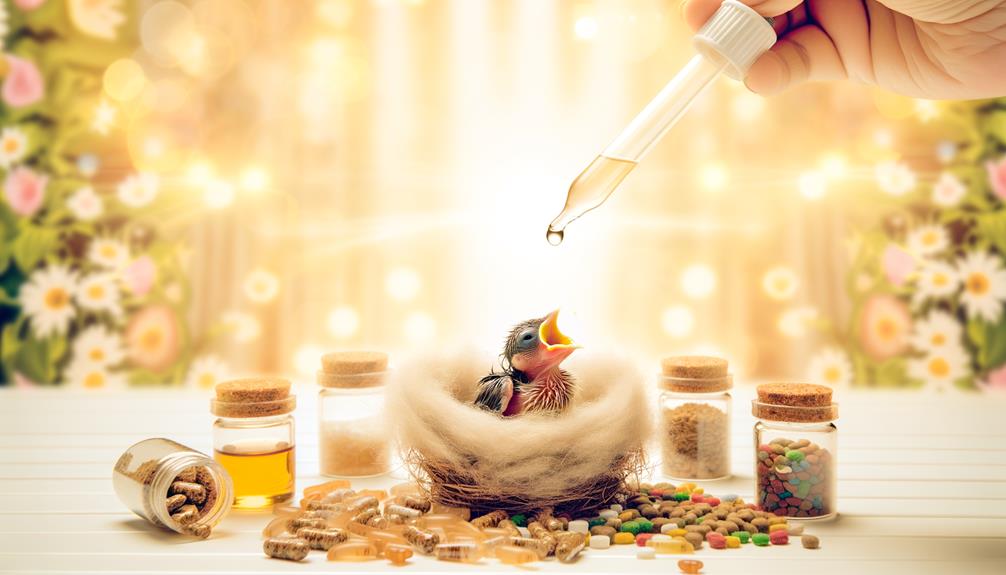
To guarantee the best health and growth of newborn sparrows, adhere to an evidence-based regimen that includes proper nutrition, hygiene, and environmental management. Feed them a high-protein diet, such as a blend of soaked dog or cat kibble with hard-boiled eggs and mealworms, making certain it's at room temperature.
Sanitize feeding tools to prevent bacterial infections. Maintain an environment between 85-90°F with a heat lamp to simulate natural warmth. Hydrate sparrows by providing small drops of water via a syringe.
Monitor their weight daily to track growth and adjust feeding frequency as needed. Clean their habitat regularly, replacing bedding to reduce pathogen exposure. Your meticulous care secures their survival and healthy development.
Conclusion
To sum up, feeding a newborn sparrow jarred baby food isn't advisable due to its unsuitable nutritional profile and potential risks.
'An ounce of prevention is worth a pound of cure,' so it's best to choose species-specific alternatives like insect-based diets.
Following these guidelines guarantees the best health and development of the bird.
Remember, proper care requires evidence-based practices and a keen understanding of their unique dietary needs to foster their growth effectively.

